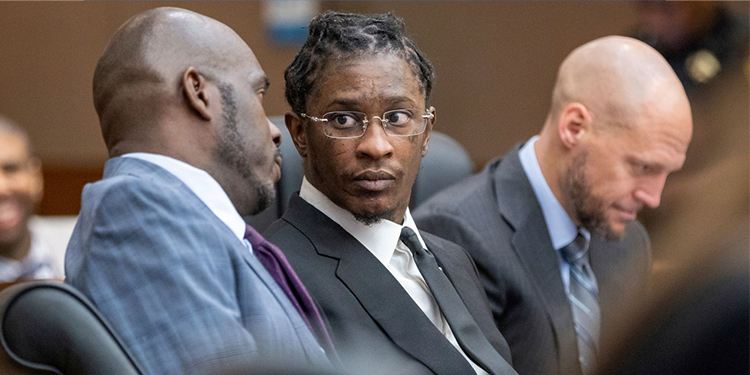On the first day of the trial against renowned American rapper Young Thug, the Atlanta (Georgia) prosecution accused him of being the “self-proclaimed leader” of a gang that operated collectively to commit crimes. The prolonged legal proceedings, marred by controversies, initiated jury selection in January, with lyrics from Young Thug’s songs included as evidence.
Georgia State contends that Young Thug’s record label, YSL, serves as a front for a criminal gang. Prosecutors argue that the accused individuals belong to a faction of the “Bloods” street gang identified as Young Slime Life (YSL).
Fulton County prosecutor Adriane Love presented the government’s case, stating, “The evidence will show that YSL meets all the requirements to be a criminal street gang,” quoting Rudyard Kipling’s “The Law of the Jungle.”
Love emphasized the significance of song lyrics: “We do not pursue the lyrics to solve the murder; we pursue the murder and find the lyrics,” she said. Citing Young Thug’s song “Take It To Trial,” she noted its “strange similarity to very true, very real, and quite specific events.” Love referred to Jeffrey Williams, the rapper’s real name, asserting that his words, conveyed through rhythmic songs, are not arbitrary.
Young Thug, one of the 28 alleged members of a street gang originally indicted for organized crime in May 2022, faces charges related to murder, assault, vehicle theft, drug trafficking, and larceny.
The defense argues that YSL represents Young Stoner Life Records, a hip-hop and trap label founded by Young Thug in 2016, constituting an artists’ association rather than a criminal gang.
Young Thug, seated in a crowded courtroom wearing a white shirt, black tie, and oval glasses, remained silent as Judge Ural Glanville detailed the charges against him and the co-defendants.
The trial, expected to extend into 2024, includes a list of potential witnesses presented by both the prosecution and the defense. The case has sparked debates about the use of rap lyrics as evidence, with critics denouncing it as a discriminatory practice targeting black artistic expression.
As the trial progresses, the legal system confronts questions surrounding the intersection of artistic freedom, cultural context, and criminal justice.










